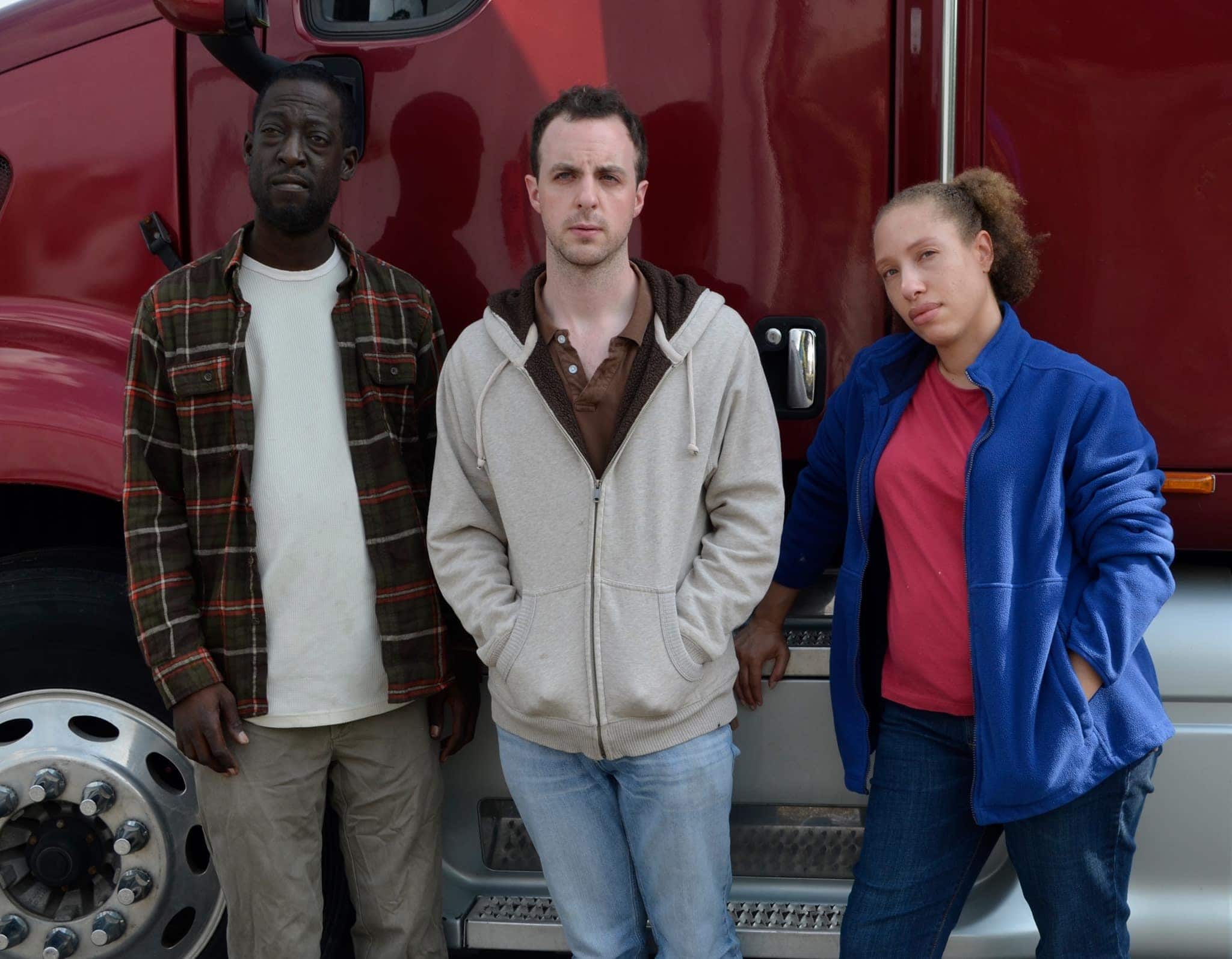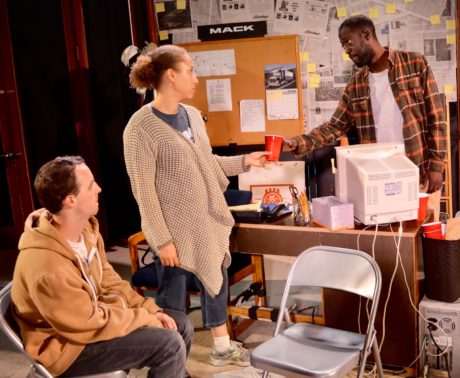The American interior West has long been a favored setting for stories about loneliness. The visual emptiness of vast open spaces – think of your favorite John Ford film – and the emotional distance between people in sparsely populated places – think the plays of Sam Shepard or, for that matter, of Brokeback Mountain – makes the West a perfect place for meditations on how isolation corrodes human souls. In its low-key, deliberate way, Samuel D. Hunter’s The Few, now being presented by the Unexpected Stage Company under the sure-handed direction of Christopher Goodrich, fits into that tradition.

Set in a forlorn, anonymous location off the Interstate in Idaho in 1999, amidst worries about the Y2K bug, before smartphones, Hunter’s script examines the relationships among three people in a place where the loneliness is so thick you could cut it with a knife.
“The Few” is the name of a shoestring publication for over-the-road truckers, founded by Bryan (Baakari Wilder), QZ (Dawn Thomas Reidy), and their now-deceased friend Jim. Jim’s young nephew Matthew (Andrew Flurer) works at the paper. Their environment, convincingly created by set designer Allison Mark and props master John Barbee, is a small cluttered office, complete with boxy computers, a printer held together with duct tape, old folding chairs, overflowing wastebaskets, and yellow sticky notes on newspapers covering the walls.
Bryan’s original concept for the publication had been as a forum for drivers’ stories, to help drivers – isolated in their cabs, lost in the placeless network of interstates, truck stops, and fast food outlets – find a sense of connection, so that they could retain some sense that they existed. But Jim died – the terrible circumstances of his death are gradually explained as the show proceeds – and his absence does much to define who the other characters have become. Then Bryan disappeared, without a word to QZ, who had been his lover, leaving QZ to try to run the debt-ridden publication by herself.
As the play begins, Bryan reappears, suddenly and without notice, after a four-year absence. Wilder speaks slowly, hesitantly, sometimes laconically, with spaces between his words. His physicality is slumped, his affect that of someone who life has defeated. His pacing is spot-on throughout, never hurrying, even when the emotions among the characters are at their most intense. When he gets drunk halfway through the play, the despair behind his alcoholism is palpable.
QZ hates living where she does, never having been more than 30 miles from her point of origin. She hates her job. But it’s what she has, and she is not about to tolerate Bryan re-entering her life and her job without a struggle. QZ’s anger about the course of her life, and about Bryan’s multiple betrayals, is the hallmark of Reidy’s performance.

QZ has made “The Few” almost self-sustaining by changing its emphasis to print personal ads, which the trucker customers phone in to the answering machine. The answering machine is a character in its own right, as it records the yearnings of drivers and others for a human connection (one of them, “Cindy,” apparently voiced by Audrey Cefaly, is a particularly important presence). One of the many points of conflict between QZ and Bryan is his dismay at this change in the paper’s direction.
QZ has taken in Matthew, thrown out of his home for being gay, as her assistant. Flurer, looking somewhat older than the character’s age of 19, plays Matthew successfully as a basket of neurotic tics, his hands fluttering everywhere, pleading in his voice as he seeks to placate everyone. He shares the bygone dream that Bryan and Jim had for the paper, hoping against hope to revive that vision. As the evening goes on, Matthew gets closer to finding his voice, becoming assertive, having a quick outburst of anger at one point, his body quieting to a degree. He sparks the comic highlight of the show, involving the not-fully-controlled use of a BB gun (a small print program note helpfully reassures the audience that the prop does not contain ammunition of any kind).
What do you do when your life has become something you never hoped for or wanted it to be? How the characters deal with this question is at the heart of The Few, and holding onto at least a shred of hope that things can be different counts as a small victory. In their own tentative, ambiguous ways, Bryan, QZ, and Matthew each try to sort this out in their own lives, leaving believable uncertainty at the play’s conclusion. (Bryan’s leaving a container of antifreeze next to, rather than in, a trash bag as he cleans up debris at before the final blackout is a particularly nice, subtle touch to this end.)
A personal note: In my day job, I have frequent occasion to talk on the phone with truck drivers. Hunter’s writing, and the acting of Wilder and the many voiceover artists cited in the program who recorded the calls, get the tone of over-the-road truckers, their insecurities, their feeling of being at the mercy of forces they don’t understand, their anger at the world’s unfairness, just right, without patronizing them. That’s a considerable achievement.
Running Time: 85 minutes, with no intermission.
The Few, presented by the Unexpected Stage Company, runs through August 4, 2019, at the River Road Unitarian Church, 6301 River Road, Bethesda MD. For tickets, call 301-337-8290 or go online.





I hope that it was your intention in referring to the BB gun moment as ‘not fully controlled’ to refer to the characters ability with the weapon, however without clarifying that, your review makes it sounds as though the actors or the situation with a gun on stage was somehow out of control or unsafe which is not at all true. The actors worked diligently with a fight choreographer to ensure everything was ‘fully controlled’.